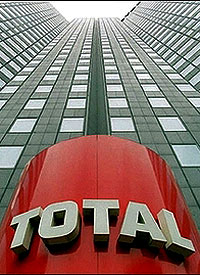The trans-Atlantic investigation stemmed from the testimony of an Italian oil trader who admitted paying illegal surcharges to Saddam"s state oil company on behalf of large oil companies, including Total and Chevron, the investigators told the International Herald Tribune and the Italian business daily Il Sole 24 Ore.
This new evidence - some of which has already been shared with French prosecutors - could strengthen the case against seven Total executives under investigation in Paris for their roles in the $64 billion United Nations oil-for-food program, which allowed Iraq to sell oil to buy civilian goods. A multinational committee led by the former U.S. Federal Reserve chairman, Paul Volcker, found the program had generated $1.8 billion in kickbacks to Saddam"s regime.
Last October, Christophe de Margerie, now chief executive of Total, was held for two days of questioning in Paris. Since then he has been under investigation, with the six others, on preliminary charges of "complicity in the abuse of company assets" and "complicity in corrupting foreign officials."
The investigating judge wrapped up his investigation last month and a prosecutor must determine whether to bring a criminal indictment. The Paris prosecutors" office declined to comment on the new evidence ahead of that decision.
A Total spokeswoman, Patricia Marie, said that, "at no time did the group circumvent the United Nations embargo against Iraq" and that the company "strictly adhered to the rules of the oil-for-food program organized under the control of the United Nations."
Italian and U.S. investigators say that the Italian oil trader at the center of the case, Fabrizio Loioli, also known as Fabrizio Loyola, mediated the sale of over 155 million barrels of Iraqi oil and, directly or indirectly, paid surcharges of more than $4.5 million through Betoil, a trading company he created in Greece and the Marshall Islands.
In a sworn statement, Loioli told the Milan prosecutor Alfredo Robledo that oil companies like Total and Chevron knew that the illegal surcharge was embedded in the premium he charged them.
On May 8, the International Herald Tribune and Il Sole 24 Ore reported that Chevron was preparing to acknowledge it should have known that illegal kickbacks were going to Saddam from oil it bought under the UN program. The admission would be part of a settlement being negotiated with U.S. prosecutors.
In the case of Total, Loioli said he sent his invoices "according to instructions I received from Nicolas Corban, the person in charge of the Middle East purchases in Geneva, I, who also was completely aware of the payment of kickbacks to the Iraqis."
Corban, contacted by telephone in Geneva, confirmed buying Iraqi oil from Loioli, but denied talking to him about the surcharges.
"Loioli approached us offering the Iraqi crude and saying that he was not paying the surcharges," Corban, a Total oil trader, said. "In fact, he signed papers to that effect."
Such written assurances were routinely sought by major oil companies buying Iraqi oil to protect themselves.
Among many documents it seized, the Italian financial police, the Guardia di Finanza, found a printout of an e-mail message sent by Betoil to Corban on July 9, 2002. The message said, in part, "We are referring to our phone call of this morning regarding the payment of the premium for tanker "Front Splendour" and to your phone conversation with Mr. Loyola."
The Guardia di Finanza also found an electronic copy of an invoice dated July 1, 2002, sent by Betoil to Corban"s Geneva offices. It was for $91,665.15, and it specified that the amount was equivalent to a premium of 15 cents a barrel applied to 611,000 barrels loaded on the tanker Front Splendour.
That oil was part of the Iraqi state oil company"s contract M/11/77, awarded by the Iraqis to a Ukrainian company. Records found by the Volcker committee show that on that contract the Iraqis levied a surcharge of 15 cents a barrel for a total of $91,665 - the amount of the invoice from Betoil to Corban"s offices.
An Italian investigator, speaking on condition of anonymity because of the continuing investigation, said the invoice "seems to indicate that Loioli was invoicing the Total group for the surcharge." In this particular case, he said, no records were found of that amount ever being paid by Loioli to the Iraqi oil company. "I wouldn"t be surprised if it turned out that he received the money from Total but never paid it to the Iraqis," he said.
But in the case of another contract, M/11/121, that was bought by Total and the British oil trader Arcadia, the Volcker inquiry found that $60,000 in surcharges was paid by an intermediary in Cyprus, Pitkin Ltd., to the Iraqis. The Italian financial police found a Betoil brochure that stated the Cypriot company was controlled by Betoil, Loioli"s company.
By spring 2002, word of the illegal surcharges levied by the Iraqis started spreading outside the oil industry. By August 2002, the Iraqis dropped them because of the increasing pressure. From Aug. 23, 2002, onwards, all invoices Loioli addressed to the Total group carried a much lower premium.
"As soon as the surcharges were lifted, Betoil started charging Total much less for the same services," noted the Italian investigator. "Our assumption is that until then Total had been willing to pay more because it was aware that part of the premium was going to SOMO," the Iraqi state oil company.
Corban denied that and attributed the changes in the premium to "market fluctuations."
PIN/IHT


Your Comment